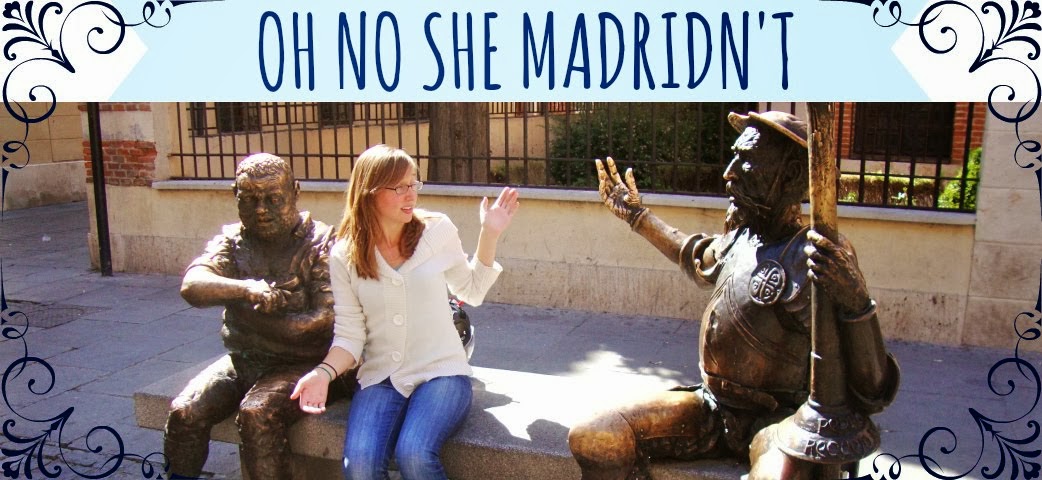[I am introducing a new type of post to the blog, which will be tagged "Caras de Madrid". These are interviews with people who live in Madrid. I hope they will expose readers to a new perspective, while allowing you to get to know some of the people I meet and interact with here.]
This week's interview is with Gregorio, one of my roommates when I studied in Madrid during the 2009-10 academic year. I have translated this interview from Spanish to English.
[THE BASICS]
Name: Gregorio Luna
Age: 45
Work/Study: I work as a night security guard for an official government office building.
From: I was born in Paris with Spanish parents.
How long in Madrid: 17 years. I lived in Paris for 29 years until 1995, and the last 17 years I've lived in Madrid.
Languages: I speak Spanish, French, and a dialect from Valencia.
[THE INTERVIEW]
Rebe: What has been the best moment/happiest time in your life thus far? Gregorio: When I worked driving car prototypes for Citroen in France from 1991-92. I had great coworkers, a good work environment, and you could drive really fast. In fact, there were some tests where you had to drive as fast as you could!
What has been the worst moment/most difficult time in your life thus far? When I met my ex-girlfriend. Also, when I started working as an auxiliar of security, a job I had from 2005-2007. I worked 12 hours a day and didn't make very much - 4 euro/hour. I worked at least 440 hours a month.
What is your favorite book, movie, and music? My favorite book and movie would be anything related to World War II. As far as music, I like a little of everything, especially rock and roll.
What is your opinion of the United States as a country? And of Americans? It's a country of contrasts, from the most developed to the most archaic; where you will find quality research about psychology, medicine, and science; yet if you make one wrong move on the street you may find yourself face to face with a gun. That's the impression that we have here [in Spain].
In general, the people are simple and nice. Normal. But too closed in and focused on themselves. I think following this dynamic, the government makes the people think that the United States is the best, and that they shouldn't get to know other ways of living, other ways to enjoy life. Watching the movie Sicko by Michael Moore got me scared about traveling to the United States. If I'm traveling in the USA and get sick or have an accident and need to go to the hospital, I could be in serious trouble since I'm not a medically insured citizen.
What's Spain's biggest problem right now? The unemployment. Justice is very slow. The lack of employment is due in part to the globalization, and part to the ability to employ workers in countries where they work in slave-like conditions. They work for a dollar or two a day, for 14-16 hours at a time without breaks.
What would you like people to know about Spain/Spaniards? That it's a country where the quality of life is very good. You can live here without too much money, and it's a country that likes to enjoy their free-time and party. Also it's very unlikely to have problems when you go out at night. Here the people know how to drink. It's very rare to have a fight between two drunk people at night.
What is the biggest problem in the world right now? Manipulation. From this problem arises all of the rest. And with how things are going in the world these days and in the geopolitical world, the problem is guessing how much time will pass until World War III comes - and that will be the last war.
Where do you see yourself in five years? In a boat in the Mediterranean.
What advice would you like to give to others? Everyone should study in a foreign country for 1-2 years. I think one should travel to open the spirit of your mind. You should travel so that you know things not because someone told you about them, but because you have lived it and experienced it.
Also, the United States needs to change. It can't be the greatest world economic power and still have a health system like the third world.
Finally, consider this: in other developed countries employees have 4-9 paid weeks of vacation per year, and the companies continue to make money. So how much are the U.S. companies profiting by only giving their workers 2 weeks of vacation per year?
Is there anything else you'd like to ask Gregorio? Are there other questions you'd like to see included in future interviews with people I meet in Madrid? Questions you'd prefer were left out next time?


No comments:
Post a Comment